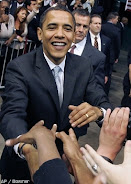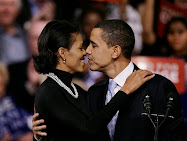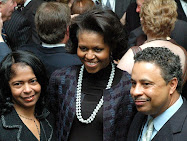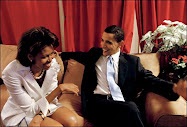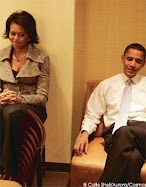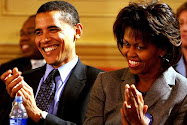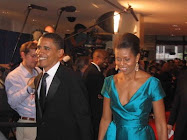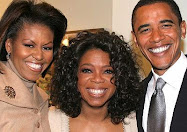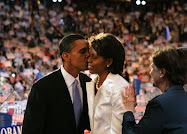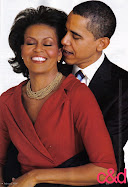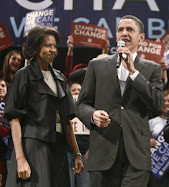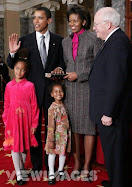
As Black and Progressive Sociologists who support the Barack Obama presidency, a friend of our cause for social justice was lost this past week, Howard Zinn. Howard Zinn has been critical to the struggles for economic and social justice, particularly with regard to our knowledge of United States and our place in it. I say to my students that "A Peoples' History of the United States" is required reading for anyone calling themselves a college graduate. Below is a tribute to Howard by Alice Walker. Zinn had played a pivotal role in her development. Howard was one of her professors at Spelman. He stood inspired her and stood with her in SNCC. She discusses this relationship and the pain of his loss. RGN
Saying goodbye to my friend Howard Zinn
By Alice Walker, Globe Correspondent
January 31, 2010
On hearing the news of his death.
Me: Howie, where did you go?
Howie: What do you mean, where did I go? As soon as I died, I went back to Boston.
I met Howard Zinn in 1961, my first year at Spelman College in Atlanta. He was the tall, rangy, good-looking professor that many of the girls at Spelman swooned over. My African roommate and I got a good look at him every day when he came for his mail in the post office just beneath our dormitory window. He was always in motion, but would stop frequently to talk to the many students and administrators and total strangers that seemed attracted to his energy of non-hesitation to engage. We met formally when some members of my class were being honored and I was among them. I don’t remember what we were being honored for, but Howard and I ended up sitting next to each other. He remembered this later; I did not. He was the first white person I’d sat next to; we talked. He claimed I was “ironic.’’ I was surprised he did not feel white.
I knew nothing of immigrants (which his parents were) or of Jews. Nothing of his father’s and his own working class background. Nothing of his awareness of poverty and slums. Nothing of why a white person could exist in America and not feel white: i.e., heavy, oppressive, threatening, and almost inevitably insensitive to the feelings of a person of color. The whole of Georgia was segregated at that time; and in coming to Spelman I had had a run-in with the Greyhound bus driver (white as described above) who had forced me to sit in the back of the bus. This moment had changed my life, though how that would play out was of course uncertain to a 17-year-old.
One way it did play out was that the very next summer I was on my way to the Soviet Union to see how white those folks were and to tell as many of them as I could, even if they were white, that I did not agree to my country’s notions of bombing them. I didn’t see a lot of generals, but children and women and men and old people of both sexes were everywhere. They were usually smiling and offering flowers or vodka. There was no “iron curtain’’ between us, as I’d been told to expect by Georgia media. I love to tell the story of how I was so ignorant at the time I didn’t have a clue who folks were queuing up to see in Lenin’s tomb; nor did I even know what the Kremlin was. I also didn’t speak a word of Russian.
Coming back to Spelman, I discovered Howard Zinn was teaching a course on Russian History and Literature and a little of the language. I signed up for it, though I was only a sophomore and the course was for juniors (as I recall). I had loved Russian Literature since I discovered Tolstoy and Dostoevsky back in the school library in Putnam County, Georgia. As for the Russian language, as with any language, I most wanted to learn to say hello, goodbye, please, and thank you.
Howard Zinn was magical as a teacher. Witty, irreverent, and wise, he loved what he was teaching and clearly wanted his students to love it also. We did. My mother, who earned $17 a week working 12-hour days as a maid, had somehow managed to buy a typewriter for me and I had learned typing in school. I said hardly a word in class (as Howie would later recall), but inspired by his warm and brilliant ability to communicate ideas and conundrums and passions of the characters and complexities of Russian life in the 19th century, I flew back to my room after class and wrote my response to what I was learning about these writers and their stories that I adored.
He was proud of my paper, and, in his enthusiastic fashion, waved it about. I learned later there were those among other professors at the school who thought that I could not possibly have written it. His rejoinder: “Why, there’s nobody else in Atlanta who could have written it!’’
It would be hard not to love anyone who stood in one’s corner like this.
Under the direction of SNCC (Student Nonviolent Coordinating Committee) many students at Spelman joined the effort to desegregate Atlanta. Naturally, I joined this movement. Howie, taller than most of us, was constantly in our midst, and usually somewhere in front. Because I was at Spelman on scholarship, a scholarship that would be revoked if I were jailed, my participation caused me a good bit of anxiety. Still, knowing that Howard and others of our professors, the amazingly courageous and generous Staughton Lynd, for instance, my other history teacher, supported the students in our struggle, made it possible to carry on. But then, while he and his family were away from campus for the summer, Howard Zinn was fired. He was fired for “insubordination.’’
Yes, he would later say, with a classic Howie shrug, I was guilty.
For me, and for many poorer students in my position, students on scholarship who also worked in the Movement to free us from centuries of white supremacy and second-class citizenship, it was a disaster. I wrote a letter to the administration that was published in the school paper pointing out the error of their decision. I wrote it through tears of anger and frustration. It was these tears, which appeared unannounced whenever I thought of this injustice to Howard and his family - whom I had met and also loved - that were observed by Staughton Lynd, who realized instantly that a) there was every chance I was headed toward a breakdown; and b) the administration would quickly find a reason to expel me from school. Added to the stress, which nobody knew about, was the fact that I was working for a well-respected older man who, knowing I had to work in order to pay for everything I needed as a young woman in school, was regularly molesting me. Lucky for me he was very old, and his imagination was stronger than his grasp. As a farm girl and no stranger to manual labor, I could type his papers with one hand while holding him off with the other. What rankled so much, then as now, is how much others respected, even venerated him.
Perhaps this was one of many births of my feminism. A feminism/womanism that never seemed odd to Howard Zinn, who encouraged his Spelman students, all of them women, to name and challenge oppression of any sort. This encouragement would come in handy, when, years later, writing my second novel, “Meridian,’’ I could explore the misuse of gender-based power from the perspective of having experienced it.
With Staughton Lynd’s help, and after he had consulted with Howie (I did not know this), I was accepted to finish my college education at Sarah Lawrence College, a place of which I had never heard. I went off in the middle of winter, without a warm coat or shoes and ice and snow greeted me. But also Staughton’s mother, Helen Lynd, who immediately provided money for the coat and shoes I needed, as well as a blanket that had been her son’s.
In my solitary room, and knowing no one on campus, I hunkered down to write. Letters to the Zinns, first of all. To inform them I had been liberated from Spelman, as they had been, and had landed.
I was Howard’s student for only a semester, but in fact, I have learned from him all my life. His way with resistance: steady, persistent, impersonal, often with humor, is a teaching I cherish. Whenever I’ve been arrested, I’ve thought of him. I see policemen as victims of the very system they’re hired to defend, as I know he did. I see soldiers in the same way. In some ways, Howie was an extension of my father, whom he never met. My father was also an activist as a young man and was one of the first black men unconnected to white ancestry or power to vote in our backwoods county; he had to pass by three white men holding shotguns in order to do this. By the time I went off to college, the last of eight children, he was exhausted and broken. But these men were connected in ways clearer to me now as I’ve become older than my father was when he died. They each saw injustice as something to be acknowledged, confronted, and changed if at all possible. And they looked for signs of humanity in their opponents and spoke to that. They both possessed a sense of humor and love of a good story that made them charismatic teachers. I recently discovered, and it amuses me, that their birth dates are close, though my father was 13 years older.
Howie and I planned to rendezvous in Berkeley in March, when he came out to spend a few weeks with his grandchildren. In April we planned to be on a panel with Gloria Steinem and Bernice Reagon at an event in New Orleans for Amnesty International. I had decided not to go, but Howie said if I didn’t come he would “sorely miss’’ me. I wrote back that in that case I would certainly be there as “soreness of any sort’’ was not to be tolerated.
Over the years I’ve been in the habit of sending freshly written poems to Roz and Howie. After her death, I continued to send the occasional poem to Howie. Last week, after the Supreme Court’s decision to let corporations offer unlimited financing to electoral candidates, I wrote a poem about what I would do if I were president, called: “If I Was President: ‘Were’ For Those Who Prefer It.’ ’’ My first act as president, given that corporations may well buy all elections in America from now on, would be to free Mumia Abu-Jamal and Leonard Peltier, both men accused of murders I’ve felt they did not commit; both men in prison for sadistically long periods of time.
Howie’s response, and the last word he communicated to me, was “Wonderful.’’ I imagined him hurriedly typing it, then flying, even at 87, out the door.
The question remains: Where do our friends and loved ones go when they die?
They can’t all go back to Boston, or wherever they’ve lived their most intense life.
I fell asleep, after leaking tears for Howie most of the day: my sweetheart’s shirt was luckily absorbent and available to me, and after tossing and turning almost all night, I had the following dream: We (Someone and I) were looking for the place we go to when we die. After quite a long walk, we encountered it. What we saw was this astonishingly gigantic collection of people and creatures: birds and foxes, butterflies and dogs, cats and beings I’ve never seen awake, and they were moving toward us in total joy at our coming. We were happy too. But there was nothing to support any of us, no land, no water, nothing. We ourselves were all of it: our own earth. And I woke up knowing that this is where we go when we die. We go back to where we came from: inside all of us.
Goodbye, Howie. Beloved. Hello.
Alice Walker is known for her poetry, nonfiction, and fiction, including her Pulitzer Prize-winning novel, “The Color Purple.’’ © 2010 by Alice Walker






